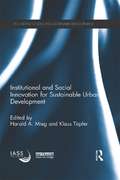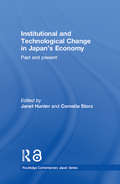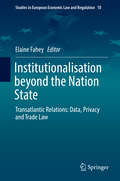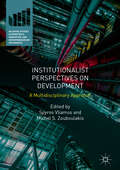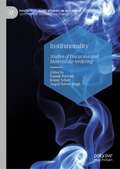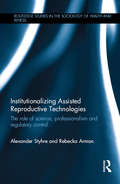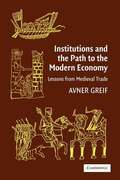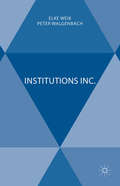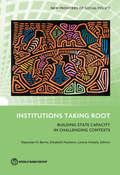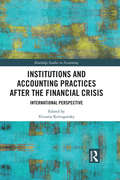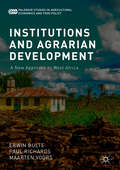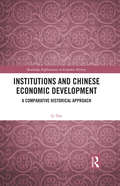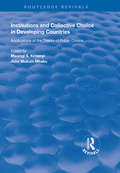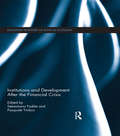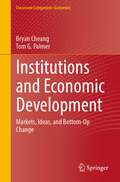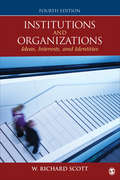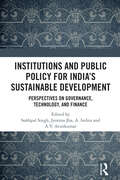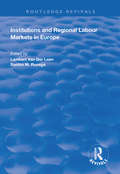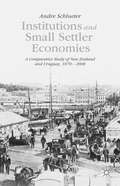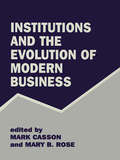- Table View
- List View
Institutional and Social Innovation for Sustainable Urban Development (Routledge Studies in Sustainable Development)
by Harald A. Mieg Klaus TöpferWhich new institutions do we need in order to trigger local- and global sustainable urban development? Are cities the right starting points for implementing sustainability policies? If so, what are the implications for city management? This book reflects the situation of cities in the context of global change and increasing demands for sustainable development. The book introduces core findings, new methods, and international experience related to sustainability innovations and the social transformation of cities, synthesizing insights from megacity research, sustainability science, and urban planning. Written by a team of more than fifty leading researchers and practitioners from all five continents, it traces general urban transformations and introduces new approaches such as: smart growth strategies; cross-sectoral, transdisciplinary urban transition management; rubanisation; and city syntegration. The book reveals the potential of new, networked agencies of sustainability transformation, and discusses the role of science institutions in the diffusion and implementation of institutional and social innovations. This comprehensive book is of immense value to students, researchers, and professionals working on issues of sustainable development, in environmental programs in human geography, planning and the built environment, sociology and policy studies, institutional economics, and environmental politics.
Institutional and Technological Change in Japan's Economy: Past and Present (Routledge Contemporary Japan Series #Vol. 6)
by Janet Hunter Cornelia StorzInstitutional and technological change is a highly topical subject. At the theoretical level, there is much debate in the field of institutional economics about the role of technological change in endogenous growth theory. At a practical policy level, arguments rage about how Japan and the Japanese economy should plan for the future. In this book, leading economists and economic historians of Japan examine a range of key issues concerning institutional and technological change in Japan, rigorously using discipline-based tools of analysis, and drawing important conclusions as to how the process of change in these areas actually works. In applying these ideas to Japan, the writers in this volume are focusing on an issue which is currently being much debated in the country itself, and are helping our understanding of the world’s second-largest economy.
Institutionalisation beyond the Nation State: Transatlantic Relations - Data, Privacy And Trade Law (Studies in European Economic Law and Regulation #10)
by Elaine FaheyThis volume collects papers that explore institutionalisation in contemporary transatlantic relations. Policymakers, lawyers, and political scientists reflect on contemporary understandings of the process as an integration of regimes and orders from an EU perspective. The papers assess whether contemporary transatlantic relations call for a different approach to global governance with a heightened emphasis on institutionalisation. The book explores a diverse range of case studies of interest to a broad readership. In particular, it focuses upon two cutting-edge issues: transatlantic data privacy rules that are emerging after the post-Edward Snowdon / NSA / PRISM revelations; and trade aspects, especially the Transatlantic Trade and Investment Partnership (TTIP) Agreement. The contributors consider these case studies from a variety of perspectives, honing in on the dynamism, method, and high politics of transatlantic relations as they have recently evolved. They critically explore the commonly held assumption that transatlantic relations have historically been considered quasi-institutionalised at best or, at worst, lacking in terms of laws and institutions. Is institutionalisation a useful meeting point for all disciplines? Does it explain regional integration meaningfully across subjects? Can institutionalisation serve to promote accountability and good governance? Contributors across disciplines and subjects address these increasingly challenging and salient questions.
Institutionalising Patents in Nineteenth-Century Spain (Palgrave Studies in Economic History)
by David PretelThis book examines the development of the Spanish patent system in the years 1826 to 1902, providing a fundamental reassessment of its evolution in an international context. The Spanish case is particularly interesting because of this country’s location on the so-called European periphery and also because of the centrality of its colonial dimension. Pretel gauges the political regulation and organisation of the system, showing how it was established and how it evolved following international patterns of technological globalisation and the emergence of the ‘international patent system’ during the late nineteenth century. Crucially, he highlights the construction and evolution of the patent system in response to the needs of Spain's technologically dependent economy. The degree of industrial backwardness in mid-nineteenth-century Spain set the stage for the institutionalisation of its modern patent system. This institutionalisation process also entailed the introduction of a new technological culture, social infrastructure and narrative that supported intellectual property rights. This book is important reading to all those interested in the history of patents and their role in globalisation.
Institutionalist Perspectives on Development: A Multidisciplinary Approach (Palgrave Studies in Democracy, Innovation, and Entrepreneurship for Growth)
by Spyros Vliamos Michel S. ZouboulakisThis book depicts the role of both formal and informal institutions in achieving long-term economic efficiency and development. It is organized into three sections: the first section deals with the historical and political roots that make institutions favorable to development; the second section offers theoretical perceptions of immaterial institutions; the last section explores how the various official institutions – such as international organizations – interrelate with the process of development. As both the recent global financial crisis and the subsequent sovereign debt crisis within the Eurozone have shown, sustainable development is a combination of human, social and institutional factors that interact with each other and go beyond the strictly economic conditions of each country. With contributions from several countries in Europe as well as Iran, this volume offers readers an international and multidisciplinary perspective of the institutionalist determinants of growth in the long run.
Institutionalist Theories of Money: An Anthology of the French School
by Pierre Alary Jérôme Blanc Ludovic Desmedt Bruno ThéretThis book gathers several important texts and offers a general overview of the institutionalist approach to money developed in France since the 1980s.These texts highlight the specificities of the French monetary approaches and display their main contributions to the understanding of monetary phenomena - not just in our developed market economies, but also in other societies. By bringing these works to an English-speaking audience for the first time, this book provides a much needed and valuable direct insight to these rich texts, and contributes to related approaches such as post-Keynesian economics and neo-chartalist approaches to money. This book highlights the need for a global vision of money and a clearer link between money and political spheres. It will appeal to students and researchers across various disciplines including but not limited to economics, anthropology, sociology, history and philosophy.
Institutionality: Studies of Discursive and Material (Re-)ordering (Postdisciplinary Studies in Discourse)
by Yannik Porsché Ronny Scholz Jaspal Naveel SinghThis edited book brings together humanities and social sciences scholars from the various disciplines at the nexus of discourse studies and ethnography to reflect on questions of institutional practices and their political concerns. Institutional order plays an important role in structuring power relations in society. Yet, contrary to common understandings of structure, institutional orders are far from fixed or stable. They constantly change, and they are resisted and reimagined by social actors. The 20 studies collected in this edited volume develop the notion of institutionality as an overarching perspective to explore how institutional actors and institutional practices order and reorder power in societies across the globe. Thereby the chapters pay special attention to the fluidity, volatility, fragility, and ambiguity of order, and consequently to its claims to authority. Employing a broad range of discourse analytic and ethnographic methodologies, the studies show how institutions are discursively and materially constructed, defined, represented and how they are made relevant and become powerful – or how they are resisted, transformed or lose significance – in interaction. Readers will obtain nuanced insights into ways in which differently positioned social actors engage in struggles about how institutions can be imagined and enacted across several domains, such as workplace interactions, architecture, mass-media representations or organisational publicity. This book will be of interest to readers in Applied Linguistics, Discourse and Society, Critical Discourse Analysis, Political Theory and Communication Studies.
Institutionalized Entrepreneurship: Flagship Pioneering
by Gary P. Pisano Hong Luo Huafeng YuInstitutionalized Entrepreneurship: Flagship Pioneering by Hong Luo, Gary P. Pisano and Huafeng Yu
Institutionalizing Assisted Reproductive Technologies: The Role of Science, Professionalism, and Regulatory Control
by Alexander Styhre Rebecka ArmanReproductive medicine has been very successful at developing new therapies in recent years and people having difficulties conceiving have more options available to them than ever before. These developments have led to a new institutional landscape emerging and this innovative volume explores how health and social structures are being developed and reconfigured to take into account the increased use of assisted reproductive technologies, such as IVF treatments. Using Sweden as a central case study, it explores how the process of institutionalizing new assisted reproductive technologies includes regulatory agencies, ethical committees, political bodies and discourses, scientific communities, patient and activists groups, and entrepreneurial activities in the existing clinics and new entrants to the industry. It draws on new theoretical developments in institutional theory and outlines how health innovations are always embedded in social relations including ethical, political, and financial concerns. This book will be of interest to advanced students and academics in health management, science and technology studies, the sociology of health and illness and organisational theory.
Institutionen und politische Ökonomie: Spielregeln und ökonomische Entwicklung (essentials)
by Pablo PeyrolónPablo Peyrolón gibt eine kurze Einführung in die Institutionsökonomie. Die Institutionen sind die Spielregeln der Gesellschaft, der Wirtschaft und der Politik, deren Dynamik der Autor hier darlegt. Das Verständnis der institutionellen Evolution ermöglicht auch eine Analyse der Formung der Wirtschaftspolitik und des ökonomischen Wandels sowie des Zusammenhangs mit dem digitalen Wandel.
Institutions And The Path To The Modern Economy: Lessons From Medieval Trade (Political Economy Of Institutions And Decisions)
by Avner GreifLessons from Medieval Trade
Institutions Inc.
by Peter Walgenbach Elke WeikInstitutions Incorporated draws together aspects of human and organizational corporeality and links them to institutions. Throughout European anthropology and culture the body has been conceptualized as the 'dark side' to soul and reason. This book explores the 'dark side' of institutions, their materiality and the bodily involvement of their users, in an environment where perfection is measured in intangible entities, notably reason and will. This innovative collection takes a closer look at the interplay of the symbolic and the material, and the triad of institutions, bodies and corporations. This exciting research examines what the tangible, 'dark side' of institutions means both for those who live in them, and those who study them.
Institutions Taking Root
by Naazneen H. Barma Lorena Viñuela Elisabeth HuybensBuilding and operating successful public institutions is a perennial and long-term challenge for governments, which is compounded by the volatile conditions found in fragile settings. Yet some government agencies do manage to take root and achieve success in delivering results earning legitimacy and forging resilience in otherwise challenging contexts. Drawing on mixed-method empirical research carried out on nine public agencies in Lao PDR, Sierra Leone, The Gambia, and Timor Leste, this volume identifies the shared causal mechanisms underpinning institutional success in fragile states by examining the inner workings of these institutions, along with the external operational environment and sociopolitical context in which they exist. Successful institutions share and deploy a common repertoire of internal and external operational strategies. In addition they connect this micro-institutional repertoire to the macro-sociopolitical context along three discernible pathways to institutional success. Institutional development is a heavily contextual, dynamic, and non-linear process but certain actionable lessons emerge for policy-makiers and development partners.
Institutions and Accounting Practices after the Financial Crisis: International Perspective (Routledge Studies in Accounting)
by Victoria KrivogorskyFinancial globalization paired with the relaxation of constraints on capital flows between countries before the 2008 crisis, increased merger activities among the World’s largest stock exchanges. The financial crisis of 2008 had a severe impact on the development of equity markets, corporate financial stability, and corporate governance, and a multi-step approach is needed to fully appreciate the causes and effects of this event. This book engages the separate strands of literature to advance a more holistic understanding of whether and how the national institutional environments in selected countries around the world has been changed after the crisis. Institutions and Accounting Practices after the Financial Crisis: International Perspective sets out a framework for the analysis of institutional environments and accounting practices in in selected countries around the world during the pre-crisis period, followed by an examination of the impact of the crisis. It scrutinizes the changing roles of debt and equity markets; the shift in accounting practices and capital financing choices due to the economic downturn; and the lessons that can be obtained from the financial crisis, while considering the institutional architecture of international business environments. This ongoing process of integration and globalization increases interdependence between world markets, and allows shocks to propagate across national and continental lines, making the understanding of international markets vitally important to American investors. Aimed at primarily researchers, academics and students in the fields of international accounting, management and finance, Institutions and Accounting Practices after the Financial Crisis: International Perspective will additionally be of value to practitioners and policy makers, supplying them with information regarding the changes in accounting practices and risk evaluation due to the crisis.
Institutions and Agrarian Development: A New Approach to West Africa (Palgrave Studies in Agricultural Economics and Food Policy)
by Paul Richards Erwin Bulte Maarten VoorsThis book argues that development strategies have thus far failed in Western Africa because the many challenges afflicting the area have yet to be explored and understood from the perspective of institutional resources. With a particular focus on three countries on the bend of the Upper West African coast – Guinea, Liberia and Sierra Leone – this book offers a theory to account for the nature of these institutional elements, to test deductions against evidence, and finally to propose a reset for rural development policy to make fuller use of local institutional resources. Based on quantitative analysis and eight years of multidisciplinary field research, this volume features several large-scale RCTs in the domain of rural development, local governance, and nature conservation. The authors address one of the biggest topics in agricultural and development economics today: the structural transformation of poor, agrarian economies, and they do so through the important and unique lens of institutions.
Institutions and Chinese Economic Development: A Comparative Historical Approach (Routledge Explorations in Economic History)
by Li TanChina’s rise as an economic power has posed some challenging questions: how did China achieve GDP growth that was even faster than the Four Asian Tigers? Is the "Chinese model" superior? Why hasn’t the rapid economic growth lead to democracy in the country as many observers expected? And can China sustain its rapid economic growth with its existing social system? Institutions and Chinese Economic Development: A Comparative Historical Approach explores these questions by studying the historical relationship between institutions and economic development in China, drawing comparisons with England, Japan and other Asian economies as appropriate. The investigation focuses on several junctures in China’s economic development: the starting point of the divergence between China and the West; the externally-provoked industrial development in the late 19th century; and the contemporary Chinese Miracle. The analysis foregrounds the role played by Chinese institutions and examines their effects on both the country’s failure to industrialize in the past and its economic achievements in recent time. The book also asks whether, without reform to the existing state institutions, China might still be subject to the historical dynastic cycles today, despite its recent economic success. This work is of great interest to students and scholars of the Chinese economy, economic history and institutional economics, as well as comparative history and Chinese studies more broadly.
Institutions and Collective Choice in Developing Countries: Applications of the Theory of Public Choice (Routledge Revivals)
by Mwangi S. Kimenyi John Mukum MbakuFirst published in 1999, this volume is written by seasoned public choice scholars and is intended to make a significant contribution to the debate on peaceful coexistence and sustainable development in developing countries. The book contains a rich mixture of analytical ideas and views on collective choice and macroeconomic performance in developing countries. This book breaks new ground in that it is the first comprehensive application of the theory of public choice to collective decision making in developing societies. It provides both students of Third World studies and policy makers in developing societies an in-depth analysis for institutions for collective choice. For countries undergoing major reform of their political and economic institutions, public choice theory can provide significant and useful insights, and help these societies design and adopt institutional arrangements that enhance peaceful coexistence of groups, the creation of wealth and sustainable development. Specifically, the book successfully shows that: (1) the application of economic theory to the study of public policy in the developing countries can provide important insights into collective decision-making; (2) the application of public choice theory to the study of developing societies can significantly improve the efficiency of bureaucratic and governmental systems, and consequently, promote economic, political and social development; and (3) public choice can help developing societies design and sustain effective laws and institutions for peaceful coexistence of groups and achieve sustainable development.
Institutions and Development After the Financial Crisis (Routledge Frontiers of Political Economy #178)
by Pasquale Tridico Sebastiano FaddaThe financial crash of 2007-2008 and the subsequent global economic crisis have raised questions about the viability of capitalism and the desirability of alternative types of economic system. In this context, Keynesian and Marxist ideas in particular have become more popular. These two approaches, along with some other heterodox perspectives, agree on the need for institutional analysis and for better institutions and governance in order to promote economic development. This volume poses fundamental institutional, evolutionary and ontological questions relating to the emergence of a new mode of governance after the financial crisis. The book argues that, contrary to the recent austerity policies implemented in the EU in particular, a new level of government involvement is required in order to keep aggregate demand stable, make full employment possible, and create a transparent financial sector, serving the real economy and encouraging productive investments. This book will be of interest to students, researchers and policy makers working in the areas of finance, institutional economics, development economics and international political economy.
Institutions and Economic Development: Markets, Ideas, and Bottom-Up Change (Classroom Companion: Economics)
by Tom G. Palmer Bryan CheangThis book is a survey of the field of development studies from a political economy perspective. It first reviews the academic literature on development and highlights the fundamental importance of institutions and social values, over and above other alternative theories, as determinants in long-run development. In this context, the book draws from the works of Nobel Laureates Douglass North, F.A. Hayek and Elinor Ostrom, and argues that the ingredients of property rights, the rule of law, and market freedoms are essential in generating socio-economic progress. Successful reforms however are not simply a function of constructing formal institutions, but must cohere with the social values, norms, and cultural commitments of local communities. It is in this spirit that the book theorises on the oft-neglected role that political entrepreneurs play in driving endogenous institutional change. Specifically, this book integrates the theoretical discussion on market-driven development with a range of case studies from around the world, featuring the bottom-up efforts of local change agents to pursue institutional reforms and changes in social opinion.
Institutions and Investments
by Jun FuAs China continues to be heralded as a rising economic power, the need for an understanding of its institutional effects--such as investment-related policies, regulations, and laws--on foreign direct investment increases as well. Institutions and Investments employs interdisciplinary perspectives from economics, business, law, and political science to shed light on the interaction between institutional changes and investment patterns and to form a clear picture of investment behavior as China's legal and regulatory infrastructure has developed over the reform years. Organized into three main parts, the book first discusses the evolution and nature of China's FDI regulatory framework. Part 2 examines the various modes and variant patterns of FDI in China in the reform years. Part 3's central task is to demonstrate a systematic link between institutional changes in China's FDI regulatory framework and the changing patterns of FDI. In conclusion, Jun Fu finds that China has made substantial progress from a command economy to a market system, but that it still has a long way to go before it truly attains a transparent and rule-based system. This book adds new dimensions to the scholarship on China as a growing economic power and will be of particular interest to international economists, political scientists, and business scholars studying China.
Institutions and Organizations: Ideas, Interests, and Identities
by W. Richard ScottCreating a clear, analytical framework, this fully updated fourth edition of Institutions and Organizations: Ideas, Interests, and Identities, by W. Richard Scott, offers a comprehensive exploration of the relationship between institutional theory and the study of organizations. Reflecting the richness and diversity of institutional thought—viewed both historically and as a contemporary, ongoing field of study—this edition draws on the insights of cultural and organizational sociologists, institutional economists, social and cognitive psychologists, political scientists, and management theorists. The book reviews and integrates the most important recent developments in this rapidly evolving field and strengthens and elaborates the author’s widely accepted “pillars” framework, which supports research and theory construction. By exploring the differences as well as the underlying commonalities of institutional theories, the book presents a cohesive view of the many flavors and colors of institutionalism. It also evaluates and clarifies developments in both theory and research while identifying future research directions.
Institutions and Public Policy for India’s Sustainable Development: Perspectives on Governance, Technology, and Finance
by Sukhpal Singh Jyotsna Jha A. Indira A. V. ArunkumarSustainable development has emerged as an overarching concern globally. Given the challenges of climate change, national economies, especially in the developing world, face unsustainable levels and patterns of growth and development. This volume looks at how India’s sustainable development has progressed through institutional changes and public policy discourse. It studies the three pillars of sustainability – technology, governance, and finance. The authors examine whether institutions have been able to work towards becoming inclusive and participatory and whether public policy can remain relevant and agile in a fast-changing world to ensure sustainable development.Written in honour of Professor Vinod Vyasulu, an erudite economist with wide-ranging interests, this volume will be of interest to academics and practitioners engaged with issues of development, policy, institutions, and technology in the fields of Economics, Sociology, Development Studies, Public Policy, and South Asian Studies.
Institutions and Regional Labour Markets in Europe (Routledge Revivals)
by Lambert van der Laan Santos M. RuesgaFirst published in 1998, this volume examines the performance of labour markets against the background of different economic and institutional settings in Western and Eastern Europe. The book gives a clear picture of the mosaic of impressive transformations presently taking place in Western and Eastern European labour markets and provides access to information which was previously either widely dispersed or non-existent. The book gives detailed information about how countries and regions deal with transformations described. The substantive country-wide and regional diversity that is discussed allows the reader to understand the role of labour and institutions in the development of countries and regions. The book is written by labour market and regional experts from the various countries concerned.
Institutions and Small Settler Economies
by Andre SchlueterInstitutions and Small Settler Economies provides a comprehensive improvement in our understanding of institutional contributions to economic growth.
Institutions and the Evolution of Modern Business
by Mark Casson Mary B. RoseThe papers in this volume demonstrate that it can be fruitful to apply institutional theory to business history. In addition, the volume shows that the wider study of the institutional environment is inseparable from the study of business. It is clear, however, that although 'institutionalism' in business history has a long pedigree, many areas of research and potential interaction with theory remain to be explored. The extent to which this will occur inevitably depends upon the degree to which the interests of theoreticians serve the needs of historians and vice versa.
